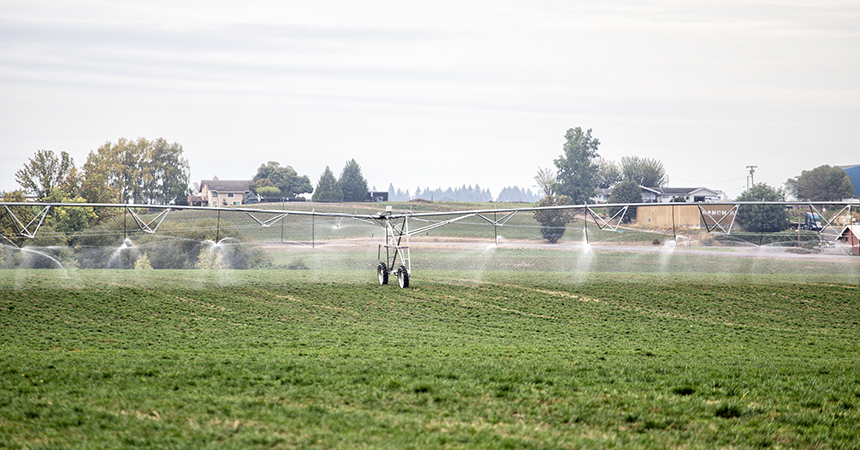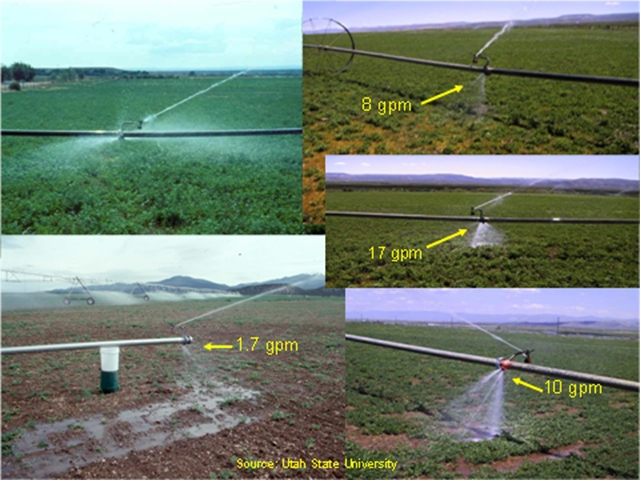
Making energy-efficient upgrades to your irrigation system can save you energy and water. Energy Trust offers rebates on irrigation hardware and can calculate incentives for pump and irrigation system upgrades to help realize energy-related savings on your farm.
Learn how to get the most out of your irrigation system. Energy Trust irrigation specialists and energy experts Steve Ziemak and Jeff Bernacki answer your frequently asked questions about irrigation systems.
Ask an expert
Q. How much energy does my irrigation system use?
The amount of energy used in an irrigation system can vary. The table below illustrates how a variety of irrigation systems compare in terms of application efficiency, pressure, annual energy cost, and initial equipment costs. For this illustration, we assumed a 100-acre field with a crop that requires 20 inches per year, and a pump that is 70% efficient.
When converting to a drip irrigation or linear/pivot system, Energy Trust offers an incentive of 25 cents per kWh saved, up to 50 percent of the installed cost. Incentives are typically five to ten percent of system cost and depend on what the upgrade is and how much water the new system will save as compared to the existing system.
| Irrigation System | Application Efficiency | PSI | Annual Energy Cost | Initial Equipment Cost |
|---|---|---|---|---|
| Big Gun Hard Hose Traveler | 60% | 100 | $7,700 | $12,000 |
| Wheel Line / Solid Set | 65% | 70 | $4,325 | $70,000 $200,000 |
| Pivot / Linear | 85% | 60 | $3,150 | $80,000 $116,800 |
| Drip / Micro Irrigation | 95% | 35 | $1,645 | $185,000 |
Q. How often should I replace my sprinkler nozzles?
Irrigation water typically contains grit and sand which can wear the nozzle out. Nozzle wear depends on how often the irrigation system is used and the amount of sand or grit passing through it. Over time, nozzles wear out and are frequently not replaced as often as they should be
Irrigation energy experts recommend replacing nozzles every five years. To test the wear of nozzles, place a drill bit snugly in a new nozzle of the proper size. If the same bit fits very loosely in an existing nozzle, the nozzle is worn and should be replaced. Worn nozzles cause more water to flow through than the intended design—overwatering crops, wasting water and energy. Energy Trust offers a rebate to replace nozzles which can be used every five years.
Q. My gaskets are only leaking a little, why should I replace them?
Even small leaks waste a lot of water and energy. For example, a leak of 1.7 gallons per minute adds up to over 1,200 gallons over a 12-hour set. On a larger scale, a 10 gallon per minute leak results in a loss of 7,200 gallons over a 12-hour set. These leaks force the pump to work harder in overtime and cause equipment to burn out sooner than expected. Leaky gaskets can also affect crops, causing them to be over- or under-watered, resulting in uneven growth across the field. Energy Trust offers an incentive to replace leaking gaskets, which can be used every five years.

Photo courteous of Wy’East Resource Conservation and Development
Q. I want to repair my leaking pipes. Does Energy Trust offer a rebate?
Energy Trust offers a $10 per section rebate for cut and press pipe repair for leaking pipes on wheel lines, hand lines or portable main lines. Reach out to your local vendor for details on the rebate offer.
Q. Are there other irrigation systems that Energy Trust offers incentives for?
Energy Trust also offers incentives for pod irrigation and scientific irrigation scheduling.
Pod irrigation systems place the sprinkler very close to ground level– saving water and energy when converting from a less efficient system like a big gun, wheel lines or hand lines. Energy Trust offers 25 cents per kWh saved for pod irrigation system upgrades.
Low Elevation Spray Application (LESA) systems use sprinklers that operate within one foot of the ground, and Low Energy Precision Application (LEPA) systems use sprinklers or bubblers that operate at the ground level. Energy Trust offers a per-drop rebate for upgrading to LESA LEPA irrigation systems. A $35 rebate for pumps serving the system with a VFD and 15$ for pumps without a VFD.
Scientific Irrigation Scheduling allows a grower to fine-tune irrigation by using soil moisture monitors, weather station data and evapotranspiration rates. Experienced vendors across the state offer the service and software that meet specifications for energy savings. In addition to water and energy savings of 10 percent or more, many growers also report reduced use of fertilizer, which has direct impacts to their bottom line and the environment.
To learn more about irrigation systems and available incentives, visit www.energytrust.org/irrigation.
